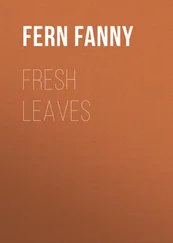Fanny Fern - Fern Leaves from Fanny's Port-folio.
Здесь есть возможность читать онлайн «Fanny Fern - Fern Leaves from Fanny's Port-folio.» — ознакомительный отрывок электронной книги совершенно бесплатно, а после прочтения отрывка купить полную версию. В некоторых случаях можно слушать аудио, скачать через торрент в формате fb2 и присутствует краткое содержание. Издательство: Иностранный паблик, Жанр: foreign_antique, foreign_prose, на английском языке. Описание произведения, (предисловие) а так же отзывы посетителей доступны на портале библиотеки ЛибКат.
- Название:Fern Leaves from Fanny's Port-folio.
- Автор:
- Издательство:Иностранный паблик
- Жанр:
- Год:неизвестен
- ISBN:нет данных
- Рейтинг книги:4 / 5. Голосов: 1
-
Избранное:Добавить в избранное
- Отзывы:
-
Ваша оценка:
- 80
- 1
- 2
- 3
- 4
- 5
Fern Leaves from Fanny's Port-folio.: краткое содержание, описание и аннотация
Предлагаем к чтению аннотацию, описание, краткое содержание или предисловие (зависит от того, что написал сам автор книги «Fern Leaves from Fanny's Port-folio.»). Если вы не нашли необходимую информацию о книге — напишите в комментариях, мы постараемся отыскать её.
Fern Leaves from Fanny's Port-folio. — читать онлайн ознакомительный отрывок
Ниже представлен текст книги, разбитый по страницам. Система сохранения места последней прочитанной страницы, позволяет с удобством читать онлайн бесплатно книгу «Fern Leaves from Fanny's Port-folio.», без необходимости каждый раз заново искать на чём Вы остановились. Поставьте закладку, и сможете в любой момент перейти на страницу, на которой закончили чтение.
Интервал:
Закладка:
“It was pity, only, that drew your heart to mine; you do not love me. I have known it a long while since. At first, the discovery gave me a pang keener than death; but I have had a long and bitter struggle with myself, and have conquered. It is not your fault that you cannot love me. To the many voices of your heart, which cry, ‘Give, give,’ my response is weak and unsatisfying. Your wife should be gifted. She should sympathise with you in your intellectual pursuits. She should stimulate your pride, as well as your love. Such an one is Charley’s mother. Your heart has already wed her, and as God is my witness, I have ceased to blame you. We cannot help our affections. I cannot help loving you, though I know her mysterious power over your heart. I have seen your struggles, your generous self-reproaches, in some sudden outburst of kindness toward me, after the indulgence of some bright dream, in which I had no share. Dear Grey, she is worthy of your love. She has a heart, noble, good and true; a heart purified by suffering. I see it in every line she writes. Should I not survive the birth of my infant, I could give your happiness into her keeping without a misgiving, though I have never looked upon her face.”
Little Hetty’s noble heart has long since ceased to throb with joy or pain. To her husband’s breast is folded the babe, for whose little life her own was yielded up. Threads of silver prematurely mingle amid his ebon locks; for memory writes only on bereaved hearts the virtues of the dead, while, with torturing minuteness, she pictures our own short-comings, for which, alas! we can offer no atonement but our tears.
AUNT HEPSY
It was a comical little old shop, “Aunt Hepsy’s,” with its Lilliputian counter, shelves and stove, and its pigmy assortment of old-fashioned ginghams, twilled cambrics, red flannels, factory cotton and homespun calicoes; its miniature window, with its stock of horn-combs and candy, tin horses and peppermint drops, skeins of yarn and Godfrey’s Cordial, gaudy picture books, and six-penny handkerchiefs, from whose center Lafayette and George Washington smiled approbatively upon the big A’s and little A’s printed round the border.
“Aunt Hepsy;” so every brimless-hatted urchin in the neighborhood called her, though it would have puzzled them worse than the multiplication table, had you asked them why they did so. Year in and year out, her ruddy English face glowed behind the little shop window. Sometimes she would be knitting a pair of baby’s socks, sometimes inventing most astonishing looking bags out of rainbow fragments of silk or ribbon. Sometimes netting watch-guards, or raveling the yarn from some old black stocking, to ornament the “place where the wool ought to grow,” on the head of some Topsy doll she was making. Sometimes comforting herself with a sly pinch of snuff, or, when sunbeams and customers were scarce, nodding drowsily over the daily papers.
Aunt Hepsy had been a beauty, and her pretty face had won her a thriftless husband, of whom champagne and cigars had long since kindly relieved her. And though Time had since forced her to apply to the perruquier, he had gallantly made atonement by leaving her in the undisputed possession of a pair of very brilliant black eyes. Add to this a certain air of coquetry, in the fanciful twist of her gay-colored turban, and the disposal of the folds of her lace kerchief over her ample English bust – and you have a faithful daguerreotype of “Aunt Hepsy.”
From the window of her little shop she could look out upon the blue waters of the bay, where lay moored the gallant ships, from whose tall masts floated the stars and stripes, and whose jolly captains might often be seen in Aunt Hepsy’s shop, exchanging compliments and snuff, and their heavy voices heard, recounting long Neptune yarns, and declaring to the buxom widow that nothing but the little accident of their being already spliced for life, prevented their immediately spreading sail with her for the port of Matrimony. Aunt Hepsy usually frowned at this, and shook her turbaned head menacingly, but immediately neutralized it, by offering to mend a rip in their gloves, or replace a truant button on their overcoats.
It was very odd, how universally popular was Aunt Hepsy. She had any number of places to “take tea,” beside a standing invitation from half-a-dozen families, to Christmas and Thanksgiving dinners, and to New-Year’s suppers. She had an eligible seat in church, gratis; an inexhaustible bottle of sherry for her often infirmities; fresh pies on family baking days, newspapers for stormy day reading; tickets to menageries, and invitations to picnics.
She always procured lodgings at a cheaper rate than anybody else; had the pleasantest room in the house at that, the warmest seat at table, the strongest cup of coffee, the brownest slice of toast, the latest arrival of buckwheats, the second joint of the turkey, and the only surviving piece of pie. To be sure, she always praised ugly babies, asked old maids why they would be so cruel as to persist in remaining unmarried, entreated hen-pecked husbands to use their powerful influence over their wives to secure to her their custom; begged the newly fledged clergyman to allow her a private perusal of his last Sunday’s able discourse; complimented ambitious Esaus on the luxuriant growth of their very incipient, and microscopically perceptible whiskers; asked dilapidated, rejected widowers, when they intended taking their choice of a wife out of a bevy of rosy girls, and declared to Editors that she might as well try to get along without her looking glass, as without their interesting newspapers.
One day, the little shop was shut up. Nine o’clock came – eleven o’clock, and the shutters were still closed, and Aunt Hepsy so punctual, too! What could it mean? Old Mrs. Brown was ready to have fits because she couldn’t get another skein of yarn to finish her old man’s stockings. Little Pat Dolan had roared himself black in the face, because he couldn’t spend his cent to buy some maple sugar; and the little match girl stood shivering at the corner for a place to warm her poor benumbed fingers, while the disappointed captains stamped their feet on the snow, stuffed their cheeks with quids, and said it was “deuced funny,” and an old maid, opposite, who had long prayed that Aunt Hepsy’s reign might be shortened, laid her skinny forefinger on her hooked nose, and rolled up the whites of her eyes like a chicken with the pip.
It was no great enigma, (at any rate not after you found it out!) Rich old Mr. Potts ventured into Aunt Hepsy’s shop, one day, to buy a watch-ribbon. He was very deaf; so Aunt Hepsy had to come round the counter to wait upon him, and the upshot of it was, that she and Cupid together, hailed him through an ear-trumpet; and all I know about it is, that they have now a legalized right to a mutual pillow and snuff-box, and that the little shop window still remains unopened, while the old maid hisses between her teeth, as Aunt Hepsy rolls by in her carriage, “How do you suppose she did it?”
THOUGHTS AT CHURCH
I have an old-fashioned way of entering church, before the bells begin to chime. I enjoy the quiet, brooding stillness. I love to think of the many words of holy cheer that have fallen there, from heaven-missioned lips, and folded themselves like snow-white wings over the weary heart of despair. I love to think of the sinless little ones, whose pearly temples have here been laved at the baptismal font. I love to think of the weak, yet strong ones, who have tearfully tasted the consecrated cup, on which is written, “Do this in remembrance of me.” I love to think of those self-forgetting, self-exiled, who, counting all things naught for Gethsemane’s dear sake, are treading foreign shores, to say to the soul-fettered Pagan, “Behold the Lamb of God.” I love to think of the loving hearts that at yonder altar have throbbed, side by side, while the holy man of God pronounced “the twain one.” I love to think of the seraph smile of which death itself was powerless to rob the dead saint, over whose upturned face, to which the sunlight lent such mocking glow, the words, “Dust to dust,” fell upon the pained ear of love. I love, as I sit here, to list through the half open vestry door, to the hymning voices of happy Sabbath scholars, sweet as the timid chirp of morn’s first peeping bird. I love to hear their tiny feet, as they patter down the aisle, and mark the earnest gaze of questioning childhood. I love to see the toil-hardened hand of labor brush off the penitential tear. I love – “ our minister.” How very sad he looks to-day. Are his parish unsympathetic? Does the laborer’s “hire” come tardily and grudgingly to the overtasked, faithful servant? Do censorious, dissatisfied spirits watch and wait for his halting?
Читать дальшеИнтервал:
Закладка:
Похожие книги на «Fern Leaves from Fanny's Port-folio.»
Представляем Вашему вниманию похожие книги на «Fern Leaves from Fanny's Port-folio.» списком для выбора. Мы отобрали схожую по названию и смыслу литературу в надежде предоставить читателям больше вариантов отыскать новые, интересные, ещё непрочитанные произведения.
Обсуждение, отзывы о книге «Fern Leaves from Fanny's Port-folio.» и просто собственные мнения читателей. Оставьте ваши комментарии, напишите, что Вы думаете о произведении, его смысле или главных героях. Укажите что конкретно понравилось, а что нет, и почему Вы так считаете.












